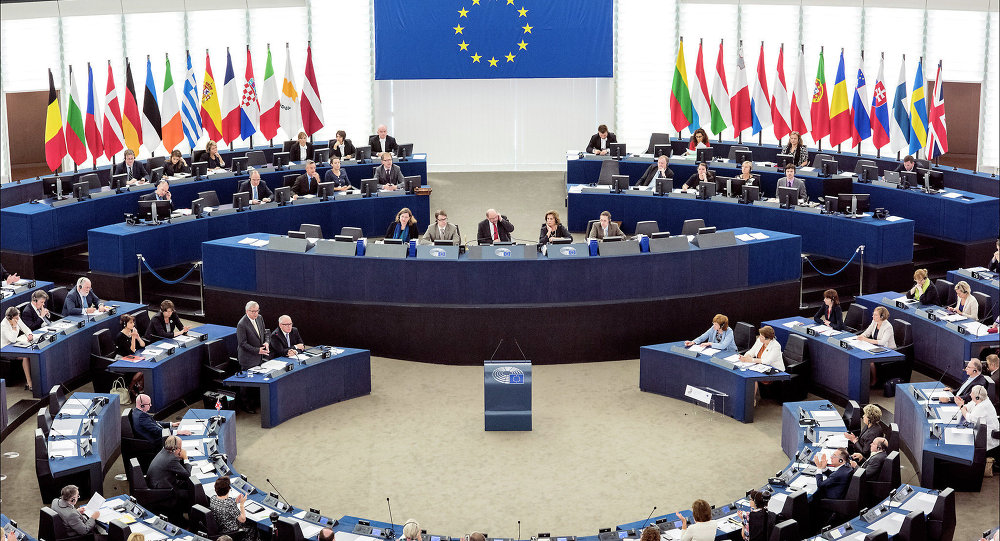European Union has called on Turkey to immediately lift the state of emergency without a delay and urged Ankara to address the gross human rights violations that took place during the same period while relations between the two sides slowly lurch toward a crunch point.
In its annual progress report on Western Balkans and Turkey, the union offered a bleak assessment of Turkey’s poor record on democracy, rule of law and human rights, themes that dominated the bulk of the diplomatic dialogue since the failed coup. Though, repeating the same points highlighted in last year’s report, the tone and forecast of this year’s paper casts pall on whatever left of remaining hopes about the prospect of Ankara’s decades-long aspirations for full membership.
Turkey has been ruled by emergency decrees since the aftermath of the coup. But the lack of legal oversight, judicial review and parliamentary check on decrees, which have the full force of law as long as the emergency rule remains in place, have constituted the core of the EU criticism in the progress report.
“Serious shortcomings affect the 31 decrees taken to date under the state of emergency,” the report noted. “They have not been subject to a diligent and effective scrutiny by parliament. Consequently, the decrees have long not been open to judicial review and none of them has yet been subject to a decision by the Constitutional Court,” it said, underlining the problems associated with decrees.
The emergency decrees, the report emphasized, “also amended key pieces of legislation which will continue to have an effect when the state of emergency is lifted.”
The report’s numbers point to a disheartening picture in Turkey. Since July 20, 2016, when the first state of emergency was declared and has been extended since then, over 150,000 people have been detained, while 78,000 have been arrested. The purge is also baffling. More than 110,000 people, the report said, have been dismissed without due process, while only a small fraction of them, 3,600, was reinstated back to their posts with later decrees.
The crushing of free media, arrests of opposition lawmakers and other forms of squelching dissent created serious cracks in Turkey’s relations with its Western allies.
“Not surprisingly, the sentiment is shifting to hostile. Particularly because of Greece and Cyprus pressures. Italians and French are annoyed as well,” Alexander Clarkson, a lecturer for German and European Studies at King’s College London, told Globe Post Turkey.
In terms of Western policy towards Turkey, he noted, there is a divide opening up between NATO and the EU. “With Turkey as a member, NATO has an inherent interest in keeping Ankara on its side,” he said.
Turkey’s worsening relations with Greek Cyprus and Greece, the escalating tension in the Aegean Sea and the Eastern Mediterranean have also reverberations for the EU.
While NATO prizes on the preservation of ties with Turkey, whatever the tension between Ankara and Brussels over political disputes, EU has a different view of the matter.
By contrast, Clarkson argued, the EU sees member states that are both NATO members (Greece) and outside NATO (Cyprus) come under pressure from Turkey in the Eastern Mediterranean and the Aegean Sea.
“The Kosovo incident, a country which is seen as of strategic importance to the EU, also worried EU figures. Ankara’s moves in the Mediterranean and West Balkans makes any progress over membership, or even renegotiation of the Customs Union less likely,” he said, expounding on the points of discord that negatively affect a web of multidimensional relations.
The Turkish intelligence agency’s snatching of a group of people linked with President Recep Tayyip Erdogan’s arch-nemesis, U.S.-based cleric Fethullah Gulen and his movement, ruffled feathers in the western Balkan country and aroused concerns in Brussels over Ankara’s international operations against dissidents.
“And if the economy gets really bad, I’m not sure how Brussels or Berlin would react to the Turkish government comes in asking for financial assistance,” he said in conclusion.
Turkey’s reaction after the release of the report was expected and harsh. Government spokesman Bekir Bozdag said the union unfairly treats Turkey.
Even positive statements praising Turkey, the deputy prime minister noted, did not mask EU’s unfair treatment of the country.
Despite the critical tone that permeated through the report, Turkey rapporteur Kati Piri appeared unimpressed. She said the chance of sending a strong message to President Erdogan has been missed with the report.
“The European Commission fails to draw any political consequences. The delusion of EU-membership is kept alive, even when a new constitution has been approved which fails to safeguard the basic principles of a democracy. #Turkey,” she tweeted.
🇪🇺 ↔️ 🇹🇷
The European Commission fails to draw any political consequences. The delusion of EU-membership is kept alive, even when a new constitution has been approved which fails to safeguard the basic principles of a democracy. #Turkey
👉🏽 https://t.co/Rt8kzMhRcn pic.twitter.com/qCgY8SoaUN
— Kati Piri (@KatiPiri) April 17, 2018
Following the report, experts and observers have grown more skeptical about any improvement in the already stalled process.
“The EU simply realizes and now officially recognizes that Turkey under Erdogan is driving away from the EU and its shared values,” Oliver H. Schmidt, a Munich-based expert on EU affairs, told Globe Post Turkey.
In a sober analysis, he said: “It doesn’t reflect a change of heart in Brussels, but it does reflect and recognize the change of heart in Turkey during the last years… prospects for Turkey’s bid keep going worse.”




Comments are closed.